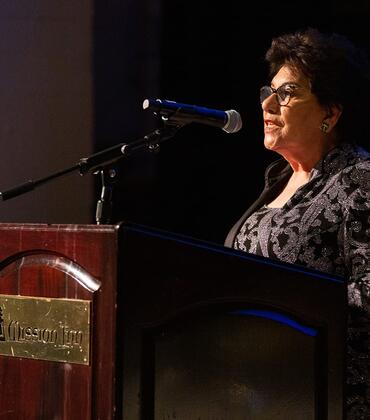
At the onset of the campus shutdown in response to COVID-19, the UCR community was tasked with converting over 3,000 courses to remote instruction for the duration of the spring quarter. In addition to restructuring how courses would be delivered, a means for administering and proctoring exams needed to be devised — no easy feat, with many classes upwards of 300 students.
A number of third-party proctoring services were considered early in the process of shifting to remote instruction, said Richard Edwards, director of the Exploration Center for Innovative Teaching & Engagement, or XCITE, and co-leader of UCR’s continuity of teaching task force. But Edwards said it quickly became apparent an outside vendor would not be feasible given how rapidly universities across the nation were forced to shut down and the number of campuses that needed these services.
“One vendor said the earliest they could do would be end of May, which is too late to be of use for a quarter system,” Edwards said. “We ran into a problem similar to hundreds of universities — once we went remote, there really was no solution out there we could just purchase.”
A solution was created in-house, spearheaded by Nathaniel Wildes, an instructional design analyst with XCITE. When winter finals had to be rapidly moved to an online platform due to the shutdown, many faculty members reached out to Wildes for assistance, he said. He devised a proctoring solution using Zoom and the learning management system, iLearn, so instructors and teaching assistants, or TAs, could monitor the exams remotely.
“It was initially a temporary solution for the end of winter quarter, but we received such positive feedback from both faculty and students, and due to the limited capacity of proctoring services, we decided to develop a more scalable alternative,” Wildes said.
Wildes then worked with the XCITE team in partnership with library staff to formalize the process and offer it as a solution for spring quarter courses. Now, faculty can learn about the process and submit a request for remote proctoring through the Keep Teaching website, developed as a resource for instructors during the campus shutdown. Requests made at least 16 days prior to exams are reviewed by the XCITE team to determine if the course fits criteria to provide their proctoring services, or recommendations are provided to instructors for developing and administering secure online assessments independently. For spring quarter finals, instructors have until May 29 to submit a request.
Presently, the proctoring service is reserved primarily for large enrollment courses that require additional support and is available only for midterms or finals, which make up a significant percentage of students’ grades. For smaller courses, or lower-stakes testing, XCITE has been offering online webinars for best practices for online tests and a range of assessment options available through iLearn.
“For courses under a certain size, we want to train faculty and TAs to self-proctor their tests,” Edwards said. “This is for really large classes that need a lot more technical support … and mostly for timed assessments through the iLearn interface.”
If it is determined a course would benefit from the proctoring service, several steps are taken to ensure a smooth test-taking experience for students and instructors. A consultation is held with the instructor to review and configure the assessment within iLearn and a checklist is distributed to students to ensure they have the appropriate technology required for testing as well as their consent to record. Training is provided to TAs a week prior to the exam.
During testing, students are divided into pre-assigned Zoom breakout rooms, depending on the size of the course, with a maximum of 49 students monitored by each proctor. This ensures that all students are visible to each proctor on a single screen in gallery view. In addition to TAs, XCITE and library staff also serve as proctors as needed. A process document can be found on the Keep Teaching website.
Several safeguards are also built into the process to help mitigate cheating. Students show their IDs next to their faces before the exam and testing sessions are recorded so faculty and TAs can review afterward. A password is required to initiate the exam, and receipt of student submissions are confirmed before students can exit the exam. Proctors can “pin” specific videos if they notice suspicious activity, enlarging them to full screen and monitoring individuals independently.
Wildes said they have also put several processes in place to help lessen disruptions in testing due to technical difficulties. All media is extracted from the exams and provided to TAs so if students have trouble accessing, they can send files independently to students through private chat in Zoom. Students are also able to leave their breakout rooms and return to the main Zoom session, where proctoring staff can provide technical support and instructors can answer questions without disrupting other students.
Kate Sweeny, a professor of psychology, used the service during midterms for a social psychology class with about 250 students. She has since recommended it to her colleagues.
Masaru Rao, an associate professor of mechanical engineering, said he used the service for a machine design class of 85 students.
“No major problems, which is especially impressive given the short timeframe they had to establish this important service to the campus,” Rao said. “Moving forward, it would seem beneficial to both students and instructors to have a uniform remote proctoring protocol in place for the majority of courses.”
Edwards believes the proctoring solution developed by Wildes can also help mitigate concerns over privacy as the service uses UCR staff as proctors instead of relying on third parties collecting data from students.
“That’s part of the elegance of the system, because we’re using the TAs who already have a relationship with the students, rather than having some stranger who doesn’t know our students watching the test,” Edwards said. “We are using Zoom to do what they would have done in a brick-and-mortar classroom.”
“I think it’s even more secure because it’s all in house,” Wildes said. “We control where this footage is maintained, and we also remove the footage after the quarter so it’s no longer available to anybody.”
The Keep Teaching website also offers guidance on different assessment types such as essays and presentations as well as an alternative assessment workshop led by Omar Safie, UCR’s director of evaluation and assessment.
Edwards is cautiously optimistic this will be a viable solution for proctoring. He said other UC campuses and UCOP have reached out about the proctoring service.
“There has been a lot of interest in the solution Nate started throughout the UC system, so it’s really a wonderful UCR innovation in this time of crises, to come up with an original solution,” Edwards said. “This is really just meeting the moment where we are. We needed a solution, we couldn’t just go on to a third party and buy it, so we did the next best thing — we invented it.”



